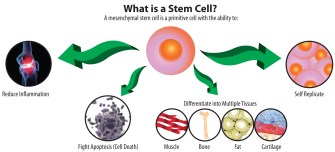Anti-aging stem cell therapy shows “remarkable” results in human trials

Stem cell therapy appears to be a safe and effective way to reverse age-related frailty among the elderly, suggest researchers at the Interdisciplinary Stem Cell Institute (ISCI) at the University of Miami Miller School of Medicine.
The researchers conducted two human clinical trials to study the safety and efficacy of stem cell therapy on frailty, a geriatric syndrome that includes weakness, muscle and weight loss, decreased energy, and increased likelihood of catastrophic injury, and which affects about 10 percent of the 50 million senior citizens in the U.S.
“These trials represent potential landmarks in the treatment of frailty,” wrote David G. Le Couteur and colleagues in an editorial accompanying the papers about the clinical trials, all published in The Journals of Gerontology. “Both studies are early-phase trials of a small number of participants, designed primarily to assess safety, so conclusions about efficacy need to be treated with caution. Even so, the results are striking and, at minimum, pave the way for large randomized Phase III clinical trials.”
A Phase III clinical trial typically involves many patients, and it’s the last stage a health intervention must pass through before it’s approved by the FDA.

The therapy tested in the clinical trials involves mesenchymal stem cells (MSC), a type of adult stem cell that scientists are studying in efforts to combat everything from brain disease to multiple sclerosis. Like all adult stem cells, MSC can self-regenerate and generate progeny of several distinct cell types, but these abilities diminish as people age. That’s why the elderly might benefit from MSC transplants from young donors.
“MSC have a number of biological properties that make them attractive as therapeutic agents: they home to sites of inflammation and tissue injury after an intravenous injection; they differentiate into many cell types including muscle and bone; they secrete bioactive compounds that induce tissue recovery and suppress inflammation; and they avoid host immune responses because of their immunomodulatory effects,” wrote Le Couteur et al.
In the first trial, 15 frail patients were administered a single MSC infusion derived from donors between the ages of 20 and 45. After six months, the participants experienced no adverse side effects and all showed improved fitness outcomes, tumor necrosis factor levels and overall quality of life.
The second trial was a randomized, double-blind study with a placebo group, and the results again showed what researchers called “remarkable” physical improvements and no negative side effects.
“With the aging of the population, stem cells hold great promise to treat aging-related disability and frailty, improving physical capacity and quality of life,” said Joshua M. Hare, who worked on the project and is Director of the Interdisciplinary Stem Cell Institute at the University of Miami Miller School of Medicine. “There is no FDA approved treatment for aging frailty and an enormous unmet need that will only increase with the changing demographics.”
Richard M. Cohen, who suffers from multiple sclerosis, was the first person in the world to be treated with mesenchymal stem cells (MSC). This is his story:





